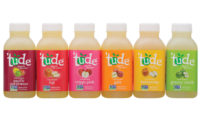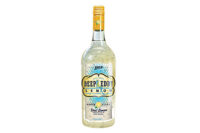Coconut water sales expanding robustly
Coconut water's natural electrolytes offer hydration benefits




Coconuts, which are the fruit of a special type of palm tree found in the tropical zone, previously could be found primarily as a flavor complement in numerous beverage categories. However, the water that is stored in the middle of the fruit as the seed develops has found its own home within the beverage industry. Coconut water, not be confused with coconut milk, has seen many beverage-makers emerge on the scene touting the drink’s electrolyte content as well as its ability to aid hydration. As these brand owners continue to share the associated benefits of this category, consumers seem to be taking notice.
“Coconut water is not a fad,” says Tom Larsen, president and general manager for Zico Beverages LLC, El Segundo, Calif. He adds that the category is growing at 30 percent annually.
Chicago-based Euromonitor International says that, compared with last year, sales of the products are doing very well, and most brands are growing by more than 10 percent. Jonas Feliciano, senior beverages analyst for the market research firm, says that this growth is a result of a combination of increased distribution and increased consumer adaption to the product. Many consumers believe that the electrolytes and potassium within coconut water make it a healthier beverage option and helps to keep them energized, he notes. The beverage also has resonated with consumers who view it as a hangover remedy, Feliciano adds.
Taking note of the beverage’s growing popularity, major beverage companies are developing new coconut water formulations. Feliciano points out how Mountain Dew, a brand of Purchase, N.Y.-based PepsiCo Inc., added two new flavors to its MTN Dew Kickstart lineup: Pineapple Orange Mango and Strawberry Kiwi. Featuring the tagline “Hydrating Boost” vertically on the cans, the new varieties combine real fruit juice with coconut water. The company is supporting the launch with its It All Starts with a Kick campaign. Among the promotions for this program was the “Come Alive” TV commercial during the Super Bowl XLIX Pre-Game Show as well as national radio promotions. It also features a real-time consumer-driven Snapchat story, along with a variety of digital and social extensions through platforms such as Vine, Twitter and YouTube, and the deployment of five MTN Dew Kickstart trucks, which will hit the road for an eight-month sampling tour at a variety of locations including college and university campuses, sporting venues and retail locations.
New York-based All Market Inc., doing business as Vita Coco, also has been bringing innovation to the category. Last summer, the brand expanded into the sports drink category with Vita Coco Sport. The line of sports drinks are natural and feature coconut water, sea salt and sugar to help replenish lost nutrients after exercise, the company says. In particular, the beverages contain 210 mg of potassium, 110 mg of sodium and 10 grams of sugar in an 8-ounce serving. The company also celebrated its 10th anniversary last year with the release of Vita Coco Lemonade, the brand’s sixth flavor, to its core portfolio.
Adding another dynamic to the market last year was Zico’s release of its Chilled Juice Blends. Made with premium coconut water and fruit juice, the blends contain naturally occurring electrolytes and as much as 50 percent fewer calories than regular fruit drinks, the company says.
The segment also has seen pineapple, lemon, mango and chocolate emerge as popular flavors. Zico’s Larsen notes that the company’s bestseller is its Natural Coconut Water, but its Chocolate Coconut Water also is showing strong growth.
Smaller brands also are seeing the potential of the category. Last year, Pulse Beverage Corp., Northglenn, Colo., expanded its Natural Cabana brand from lemonade to coconut water with the introduction of Natural Cabana Coconut Water and Pineapple Coconut Water. Both products contain 60 calories and approximately 10 grams of sugar in each serving. Sydney-based FAL Healthy Beverages also introduced a new line of coconut water last year with Coco Joy Kids. The coconut waters launched in conjunction with the July 15 world premiere of Disney’s “Planes: Fire & Rescue” in Hollywood. The beverages are made from fresh, young green coconuts from Southeast Asia and feature Disney characters on the packaging. Coco Joy Kids is available in Pineapple, Banana, Watermelon and Strawberry flavors.
Looking ahead
Zico’s Larsen touts coconut water's potential growth. “Coconut water is one of the fastest-growing beverages in the United States and [the] world, but the category is still in its infancy,” he says. “We’re excited to watch as more and more people discover coconut water.”
Euromonitor’s Feliciano says the Top 3 companies in the coconut water segment are One Natural Experience (O.N.E.) Coconut Water, of which PepsiCo owns a majority stake; Vita Coco; and Zico, which is owned by The Coca-Cola Co., Atlanta. Growth continues to be brisk, but the rate of growth has slightly slowed during the past few years, he says. It would appear that there are fewer areas of distribution to grow into, but more people are discovering the benefits of coconut water, and therefore volume is expected to continue to increase for the foreseeable future, Feliciano explains.
Coconut water was the surprise toast to the beverage industry as it grew by more than 540 percent from 2008 through 2012, according to Chicago-based Mintel. New product launches went from 17 percent in 2008 to 35 percent in 2012 in North America, it notes. The beverage also has gained steamed globally. Europe went from 14 percent in 2008 to 34 percent in 2012, and the Asia Pacific market reported growth from 9 percent in 2008 to 14 percent in 2012. Contrastingly, Latin American declined from 61 percent in 2008 to 16 percent of new introductions in 2012, Mintel reports.
Health issues
Because coconut water naturally contains potassium and sodium, beverage-makers are not only highlighting the beverage for its refreshment qualities but also for its health benefits.
“We believe coconut water can be the start of something good: a good choice, good hydration, maybe even a part of a good life that includes a balanced diet and exercise,” Zico’s Larsen says.“... Coconut water is naturally gluten free, lactose free, and dairy free, and one bottle contains as much potassium as a banana.”
According to Mintel, coconut water’s naturally high levels of electrolytes have made the beverage popular as a sports drink for natural foods consumers. In addition, coconut water benefits from the success of the already-established sports recovery drinks and enhanced water segments and falls into a similar use occasion, it adds.
Celebrity marketing
Top producers of coconut water for the U.S. market have utilized celebrity endorsements to help garner attention for their brands.
Last year, Zico launched its Crack Life Open national campaign starring Jessica Alba. As Larsen says, “In a nutshell, Crack Life Open means living positively and thoughtfully by making healthier choices and taking small steps to treat yourself well every day." Throughout the campaign, Zico and Alba have worked together to motivate people to start living the life they want, the company says.
As brand owners find new ways to market their coconut water products to mainstream consumers, it looks as though the sales numbers are supporting the maturation of the market. Last year, The Huffington Post reported that coconut sales started at less than $50 million in 2009, grew to just more than $50 million in 2010, hit nearly $150 million in 2011, reached more than $275 million in 2013, and topped $400 million in 2014. Such a promising upward curving graph indicates that good things are ahead for coconut water.
Looking for a reprint of this article?
From high-res PDFs to custom plaques, order your copy today!









